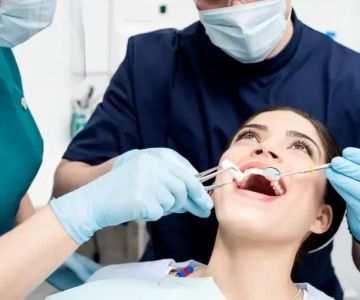Common Children's Dental Emergencies and Their Management
Children are always full of energy and prone to accidents, which can sometimes lead to dental emergencies. From knocked-out teeth to chipped or fractured teeth, and from toothaches to injuries to the soft tissues of the mouth, there are several situations that parents need to be prepared for. Let's take a closer look at each of these common emergencies and the appropriate steps to take.
Knocked Out Tooth
If your child's permanent tooth is knocked out, it's crucial to act quickly. Control any bleeding. Try to find the tooth, being careful not to touch the root. Gently rinse away debris with water and reinsert the tooth into the socket if possible. Have your child bite down on a piece of cloth or gauze to hold the tooth in place. Call your dentist immediately as reimplanting the tooth is most successful within an hour. If you can't reinsert the tooth, keep it moist by storing it in cold milk or having your child hold it in their mouth (if they are old enough and not at risk of swallowing it). Transport the tooth to the dentist wrapped in a wet cloth if needed. For a knocked-out baby tooth, while reimplantation is not advised, it's still important to see the dentist as the other teeth might shift, causing orthodontic issues.
Tooth Knocked Out of Position
If a child's tooth is knocked out of position but still in the socket, control the bleeding and carefully push the tooth back into place. Have your child gently bite on gauze or a cloth to hold the tooth in position and see a dentist as soon as possible.
Chipped or Fractured Tooth
A chipped tooth in kids is treatable. For minor chips, a tooth-colored filling or dental bonding might do the trick. For more severe damage, a dental crown could be necessary. Control any bleeding, have your child rinse their mouth with warm water, and make sure there are no tooth fragments left in the mouth. If you can find the tooth fragments, bring them to the dental appointment. For a large chip, loose tooth, or if your child is in pain, visit the dentist promptly. Place a cold compress on the cheek in the area of the injury on the way to the dentist.
Toothache
If your child has a toothache, have them rinse their mouth with warm water and gently floss to remove any debris. If the pain persists, call your pediatric dentist to schedule an appointment. Do not put aspirin on the tooth and gums as it can burn the gum tissue. Instead, give your child an over-the-counter pain reliever. If your child has facial swelling and severe pain, it could be a sign of infection, and you should call the dentist immediately. Place a cold compress on their face to help with the swelling.
Injuries to Cheeks, Lips, or Tongue
If your child sustains an injury to their lips or tongue, have them rinse their mouth with warm water to assess the injury. Apply pressure with a clean cloth or gauze to stop the bleeding. If there's swelling, have them hold an ice pack or cold compress wrapped in a towel to the affected area. Seek medical attention if the bleeding doesn't stop or if you think stitches might be needed.
Broken Jaw
If you suspect your child has a broken jaw, seek medical care immediately. A blow strong enough to break the jaw could also cause a concussion. Apply a cold compress to the jaw to control swelling while going to the emergency room.
Prevention Tips
To prevent dental emergencies, always have your child in a seatbelt or car seat, childproof your home to prevent falls and other injuries, have your child visit the dentist regularly, don't let them chew on hard substances like ice, popcorn kernels, and hard candy, and follow good oral hygiene practices to keep their teeth strong and healthy.
Conclusion
Managing dental emergencies for children requires a calm approach and quick action. By knowing what to do in each situation and seeking professional help promptly, you can minimize the damage and ensure your child's dental health. Remember, the most important thing is to stay calm and act swiftly to give your child the best chance of a healthy smile. If you have any concerns or need further advice, don't hesitate to contact your pediatric dentist or visit the emergency room.




 Westgate Dental Arts
Westgate Dental Arts Coventry Family Dental
Coventry Family Dental Familia Dental
Familia Dental Dr. Daniel S. Fife, DDS
Dr. Daniel S. Fife, DDS Dentistry At Suburban Square: Michael I. Wollock, DMD
Dentistry At Suburban Square: Michael I. Wollock, DMD Comfort Care Dental
Comfort Care Dental The Importance of Oral Health Education During Pregnancy for a Healthy Pregnancy
The Importance of Oral Health Education During Pregnancy for a Healthy Pregnancy Why Skipping Dental Checkups Can Lead to Bigger Oral Health Problems
Why Skipping Dental Checkups Can Lead to Bigger Oral Health Problems Advantages of Porcelain Dental Restorations
Advantages of Porcelain Dental Restorations Best Tips for Brushing Your Teeth Properly for Healthy Gums: Essential Techniques for Oral Health
Best Tips for Brushing Your Teeth Properly for Healthy Gums: Essential Techniques for Oral Health How Can Diabetes Cause Tooth and Gum Problems? Preventing and Managing Oral Health Issues
How Can Diabetes Cause Tooth and Gum Problems? Preventing and Managing Oral Health Issues Healthy Habits for Promoting Good Oral Health and Hygiene: Tips for a Healthy Smile
Healthy Habits for Promoting Good Oral Health and Hygiene: Tips for a Healthy Smile